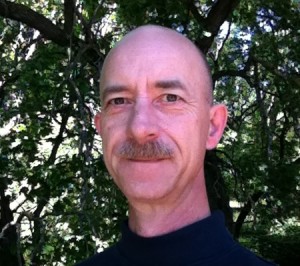A guest post by Rob Riddell.
There is a crystalline moment that keeps me writing. At a wonderful production of one of my plays, a talented director and cast came together on a gorgeous set. I sat on opening night in the dark, anticipating. My emotions roiled as if I was about to ask someone out on a first date. The lights were about to come up.
The play was about the change in relationship that occurs between couples, and a bit about rebranding oneself. The setting was in the time of Robin Hood and Maid Marion, but with some current sensibilities. There were seven main couples, all at a different point in their relationship. From the “failed to launch” couple to the “why am I still married to you” couple, the actors had brought the couples to life. Almost.
During the weeks of long rehearsals, the actors worked through the characters and action and the play came together. The big sword fight enacted by a couple of guys with martial arts training looked fantastic! The comedy and drama seemed to come through as hoped—for the most part. But the couple that represented a relationship like my grandparents struggled to find the comedy. Somehow, they could find the pathos, yet missed the joy. Out of all the parts of the play, no matter what they tried, their scenes missed the magic everyone else could create.
The director and I worried, because we both wanted to deliver to the audience the best performance possible. This seemed to be the one point everyone had doubts about. People feared that whenever that couple was onstage, they slowed down the energy of the play. Also, I noticed that during rehearsals, when that particular couple performed, the director would smile, but even he never laughed. I offered to rewrite, but we couldn’t come up with alternatives that would get us a better result. Finally, after the dress rehearsal, the director shrugged and said, “Have faith in the actors and material.”
So I did.
Sitting in the dark theatre beside the director and the sound tech, I waited to see what would happen. The play began, and the audience responded well to the parts we hoped would work, and early in scene one, the lights came up on the couple. The guy stood onstage, within his character, as usual. Then he delivered his first tentative line to his onstage wife. From out of the darkness behind us, a lady laughed. Not just the titter of a young schoolgirl, but a good honest laugh. The reaction onstage was electric. The wife looked up at her husband with a new light in her eye. The wonderful actress absorbed that lady’s laugh. When she now looked up at her husband, under the lights of the stage, her look told everyone that she had been married to this guy for a long time, that she could deal with whatever he was about to come up with. She started delivering her lines as a wise married woman, and the lady hidden behind us loved it. The husband fed from this and his character grew to match his wife. As the scene progressed, that singular laugh grew to the fully committed laugh of someone who really knew those characters. She just knew. Her laugh carried the whole audience along. The couple onstage blossomed. They performed.
Throughout the rest of the night, each time that couple came onstage, everyone in the audience began to anticipate their antics. What was feared to be the weak point of the night became the lynchpin. The rest of the actors took that fantastic energy and made their scenes truly glow. The magic they had worked so hard to achieve hung that night in the space between the cast and the audience. I sat anonymously in wonder and amazement, humbled at their tangible yet insubstantial creation.
When the lights came up, I searched the crowd to see if I could identify the owner of that laugh. For a fleeting moment, I wanted to identify myself as the playwright and tell her I was grateful. But I couldn’t immediately find her, and then my courage left like a will-o’-the-wisp in the dark, so my thank you went unsaid forever.
I write so that someday I can feel that wonder again, the electric moment when words come alive and snap into focus, to create the play between the characters and their audience, which is held in accord between the two, right up until the very end of the story.
 Guest Writer Bio:
Guest Writer Bio: Rob Riddell has been hooked on playwriting ever since Grade Five. He wrote his first play about Edward Teach, so he and his buddies could have swordfights on stage. Currently, he joyously writes plays and acts with the CandleWick Players in southern Manitoba.
